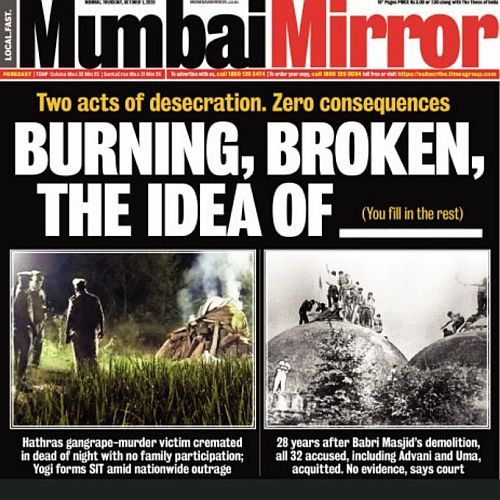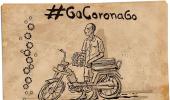Abhishek Mande Bhot recalls his stint at Mumbai Mirror, the iconic Mumbai daily newpaper, which its owners, the Times of India group, decided on Saturday to convert to a weekly newspaper.

In the summer of 2005, an underling from Human Resources deposited me at the doorstep of Meenal Baghel, the editor of the newly launched paper Mumbai Mirror.
I was to join the features team of the paper that day.
Except no one from the team had showed up that day.
A few hours later, Meenal summoned me into her office and suggested I spend the day on the Entertainment desk because "it's not good to go back on your first day."
There was kindness in her eyes and warmth in her words.
As I would discover later, it didn't mean she wasn't a hard taskmaster.
For the next 13 months, I, like almost everyone else on the desk, lived in constant fear of Meenal barging out of her office picking up the Concise Oxford Dictionary and slamming it hard on our desks, demanding to "see the *&^%ing pages!"
Every day was a trial by fire.
Years later, when I was in a position to recruit young colleagues a year at Mirror was all the qualification I looked for in a potential hire.
If you'd survived a year in Mirror, you were hired -- without copy tests, without references.
Meenal's colourful vocabulary and the urgency of her demeanour pretty much summed up the mood of the Mumbai Mirror newsroom.
In a building that housed the offices of The Times of India and Economic Times, Mirror's bullpen was an anomaly.
It was young, it was loud, and it gave zero *&^%s about what our colleagues of the established papers in the building thought of us.
All of 22 and with a newly minted master's degree, I held the world in utter contempt.
In the Mirror newsroom, I was right at home.
Almost everyone in the paper had something to prove -- from Meenal, whose first job it was as editor, to people like me, who had started our career in journalism here.
It gave the paper an edge that almost no other paper at the time had.
2005 was an exciting moment in the Mumbai publishing scene.
The Hindustan Times had launched its first Mumbai edition, Zee made its foray into print with DNA, even as Mid-Day continued to hold its own in the face of stiff competition and mass poaching of its staff (mostly by Mirror).
Never before had the city's publishing scene been so exciting. And never before has it been as dead.
In a week, Mumbai Mirror will cease its daily publication, but will continue living as a weekend paper.
What that means is still unclear, but what's certain is that the reporters, copy editors, and designers -- the people who were the soul of this exciting enterprise -- will be rendered jobless.
Colleagues from the Pune edition of the paper will also meet the same fate.
For the entire duration of its existence, Mumbai Mirror thumbed its nose at everything the Times stood for.
It broke stories that Times couldn't (or didn't want to), and it stood up to the establishment.
Importantly, it covered the city news that national dailies didn't deign to report about.
In doing so, it gave a voice to the people of Mumbai -- the citizens, the immigrants, the strugglers, the dreamers.
With the closing down of Mumbai Mirror, India has lost an important paper, but the city has lost a part of its soul.
And nothing will ever be the same again.
Feature Presentation: Aslam Hunani/Rediff.com










